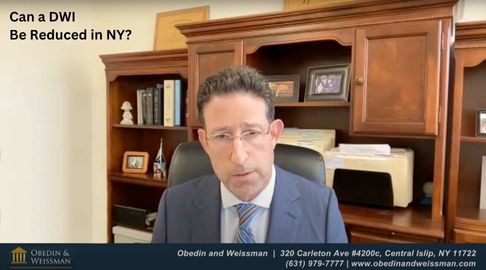If you’ve been charged with DWI in New York, one of the first questions you’re likely to ask is whether the charge can be reduced. The good news is that under the right circumstances, a DWI can be reduced—but it depends heavily on the facts of your case, your criminal history, and the skill of your attorney.
How DWI Charges Work in New York
DWI charges in New York fall under two primary categories: misdemeanor and felony. A first-time DWI is usually charged as a misdemeanor, while a second offense within 10 years—if there’s a prior DWI conviction—is often charged as a felony. Both carry serious consequences including fines, license suspension, a criminal record, and even jail time.
So what does it mean to have a DWI “reduced,” and when is it possible?
Common DWI Reductions in NY
A reduction means that instead of pleading guilty to the original DWI charge, you and your attorney work out a deal with the District Attorney’s Office to plead guilty to a lesser offense. Some of the more common DWI reductions include:
1. DWI Reduced to Driving While Ability Impaired (DWAI)
DWAI is a traffic infraction, not a crime. This is the most common reduction for a misdemeanor DWI charge. It carries fewer penalties, lower fines, and most importantly, it does not result in a criminal conviction.
2. Felony DWI Reduced to a Misdemeanor
If you’ve been charged with a felony DWI—usually because you have a prior conviction within the last 10 years—it may be possible to negotiate a reduction to a misdemeanor. This is less common and depends greatly on the circumstances, but an experienced DWI attorney may be able to negotiate this outcome in some cases.
3. Other Reductions Based on Legal Defenses
Sometimes a reduction happens because of evidentiary issues, such as:
-
Improper traffic stop
-
Lack of probable cause
-
Inaccurate breath or blood test results
-
Violations of constitutional rights
In these situations, your lawyer may challenge the admissibility of key evidence or file motions that weaken the prosecution’s case, making a reduction—or even a dismissal—more likely.
Why You Need an Experienced Attorney to Seek a Reduction
Reducing a DWI is not automatic. Prosecutors typically don’t offer a reduction unless:
-
There are weaknesses in their case
-
You have no prior criminal record
-
You were cooperative during your arrest
-
You have a strong legal advocate negotiating on your behalf
That’s where experience matters. At Obedin and Weissman, we understand how DWI cases are prosecuted in Suffolk County and across New York. Our attorneys not only handle DWI cases—we try them in court. That trial experience gives us leverage in negotiations and makes us better equipped to fight for reductions, dismissals, or acquittals.
Can Your DWI Be Reduced?
There’s no one-size-fits-all answer. The outcome will depend on:
-
The nature of the charge (misdemeanor or felony)
-
Your driving and arrest history
-
The facts of your case (accident? injuries? refusal to take test?)
-
The strength of the evidence
-
Your choice of legal representation
The best step you can take right now is to speak with a knowledgeable DWI defense lawyer who can evaluate your case and explain your options.
Get Trusted Legal Help If You’ve Been Charged with DWI in NY
If you’ve been arrested for driving while intoxicated in New York, time is critical. At Obedin and Weissman, we are available 24/7 to answer your call, explain your rights, and begin working on your defense immediately. Whether we fight the charge outright or negotiate a strategic reduction, our goal is always to protect your future.


